This text is part of the Teaching Hard History Text Library and aligns with Key Concept 6.
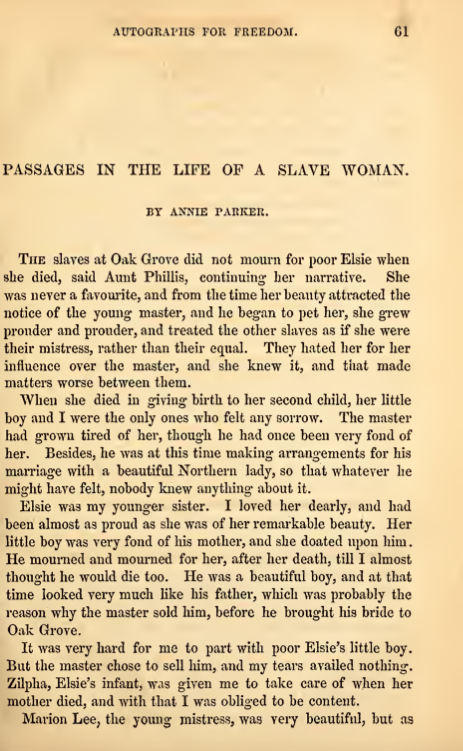
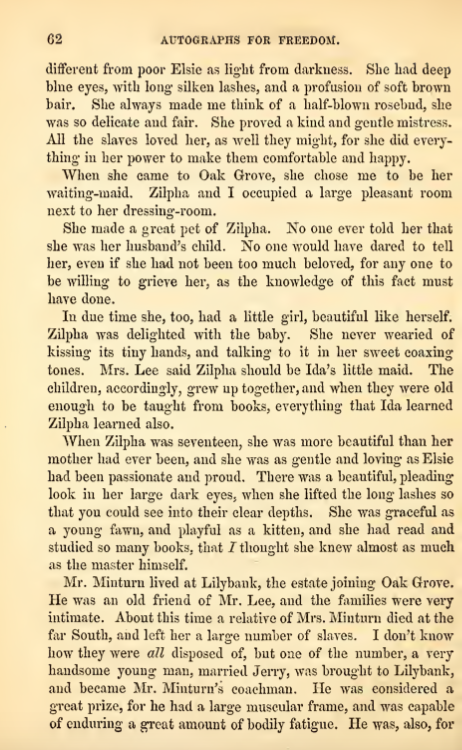
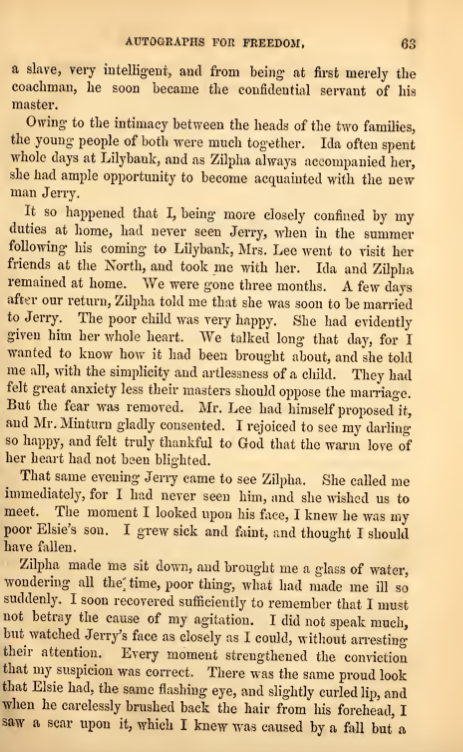
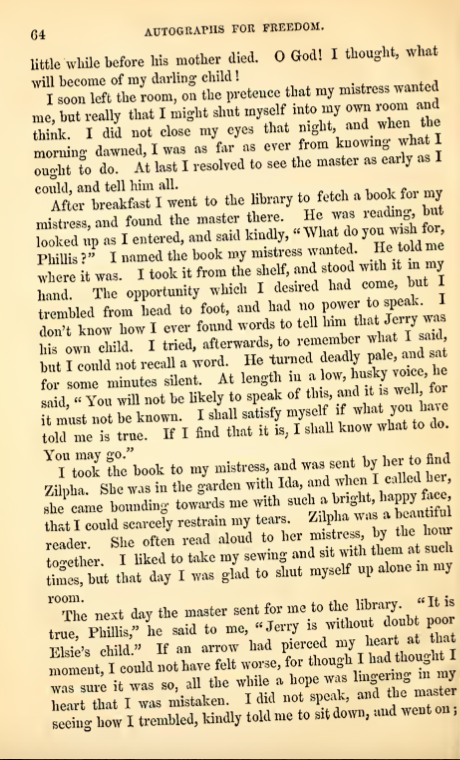
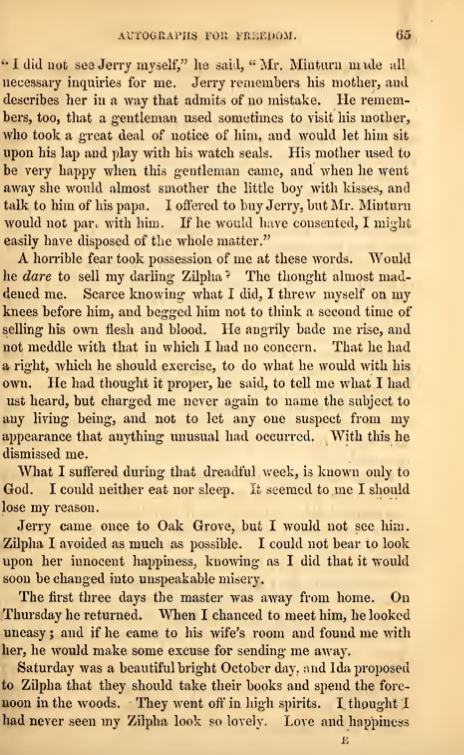
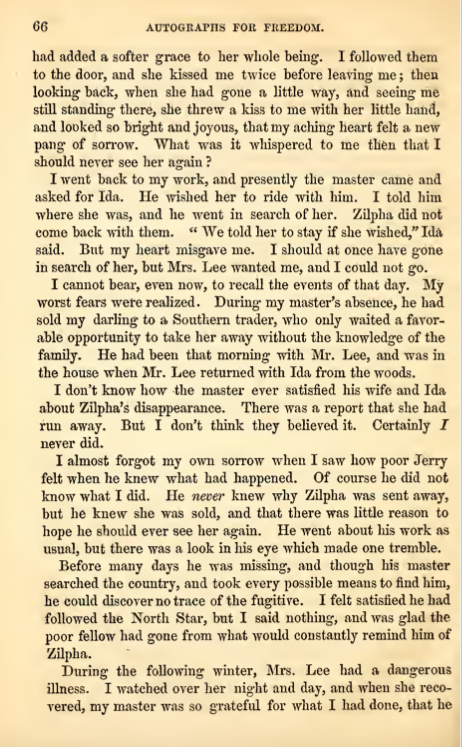
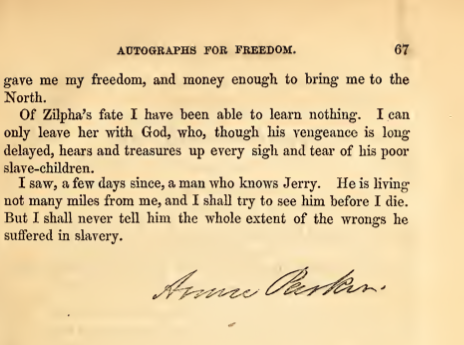
PASSAGES IN THE LIFE OF A SLAVE WOMAN.
BY ANNIE PARKER.
The slaves at Oak Grove did not mourn for poor Elsie when she died, said Aunt Phillis, continuing her narrative. She was never a favourite, and from the time her beauty attracted the notice of the young master, and he began to pet her, she grew prouder and prouder, and treated the other slaves as if she were their mistress, rather than their equal. They hated her for her influence over the master, and she knew it, and that made matters worse between them.
When she died in giving birth to her second child, her little boy and I were the only ones who felt any sorrow. The master had grown tired of her, though he had once been very fond of her. Besides, he was at this time making arrangements for his marriage with a beautiful Northern lady, so that whatever he might have felt, nobody knew anything about it.
Elsie was my younger sister. I loved her dearly, and had been almost as proud as she was of her remarkable beauty. Her little boy was very fond of his mother, and she doated upon him. He mourned and mourned for her, after her death, till I almost thought he would die too. He was a beautiful boy, and at that time looked very much like his father, which was probably the reason why the master sold him, before he brought his bride to Oak Grove.
It was very hard for me to part with poor Elsie’s little boy. But the master chose to sell him, and my tears availed nothing. Zilpha, Elsie’s infant, was given me to take care of when her mother died, and with that I was obliged to be content.
Marion Lee, the young mistress, was very beautiful, but as different from poor Elsie as light from darkness. She had deep blue eyes, with long silken lashes, and a profusion of soft brown hair. She always made me think of a half-blown rosebud, she was so delicate and fair. She proved a kind and gentle mistress. All the slaves loved her, as well they might, for she did everything in her power to make them comfortable and happy.
When she came to Oak Grove, she chose me to be her waiting-maid. Zilpha and I occupied a large pleasant room next to her dressing-room.
She made a great pet of Zilpha. No one ever told her that she was her husband’s child. No one would have dared to tell her, even if she had not been too much beloved, for any one to be willing to grieve her, as the knowledge of this fact must have done.
In due time she, too, had a little girl, beautiful like herself. Zilpha was delighted with the baby. She never wearied of kissing its tiny hands, and talking to it in her sweet coaxing tones. Mrs. Lee said Zilpha should be Ida’s little maid. The children, accordingly, grew up together, and when they were old enough to be taught from books, everything that Ida learned Zilpha learned also.
When Zilpha was seventeen, she was more beautiful than her mother had ever been, and she was as gentle and loving as Elsie had been passionate and proud. There was a beautiful, pleading look in her large dark eyes, when she lifted the long lashes so that you could see into their clear depths. She was graceful as a young fawn, and playful as a kitten, and she had read and studied so many books, that I thought she knew almost as much as the master himself.
Mr. Minturn lived at Lilybank, the estate joining Oak Grove. He was an old friend of Mr. Lee, and the families were very intimate. About this time a relative of Mrs. Minturn died at the far South, and left her a large number of slaves. I don’t know how they were all disposed of, but one of the number, a very handsome young man, married Jerry, was brought to Lilybank, and became Mr. Minturn’s coachman. He was considered a great prize, for he had a large muscular frame, and was capable of enduring a great amount of bodily fatigue. He was, also, for a slave, very intelligent, and from being at first merely the coachman, he soon became the confidential servant of his master.
Owing to the intimacy between the heads of the two families, the young people of both were much together. Ida often spent whole days at Lilybank, and as Zilpha always accompanied her, she had ample opportunity to become acquainted with the new man Jerry.
It so happened that I, being more closely confined by my duties at home, had never seen Jerry, when in the summer following his coming to Lilybank, Mrs. Lee went to visit her friends at the North, and took me with her. Ida and Zilpha remained at home. We were gone three months. A few days after our return, Zilpha told me that she was soon to be married to Jerry. The poor child was very happy. She had evidently given him her whole heart. We talked long that day, for I wanted to know how it had been brought about, and she told me all, with the simplicity and artlessness of a child. They had felt great anxiety less their masters should oppose the marriage. But the fear was removed. Mr. Lee had himself proposed it, and Mr. Minturn gladly consented. I rejoiced to see my darling so happy, and felt truly thankful to God that the warm love of her heart had not been blighted.
That same evening Jerry came to see Zilpha. She called me immediately, for I had never seen him, and she wished us to meet. The moment I looked upon his face, I knew he was my poor Elsie’s son. I grew sick and faint, and thought I should have fallen.
Zilpha made me sit down, and brought me a glass of water, wondering all the time, poor thing, what had made me ill so suddenly. I soon recovered sufficiently to remember that I must not betray the cause of my agitation. I did not speak much, but watched Jerry’s face as closely as I could, without arresting their attention. Every moment strengthened the conviction that my suspicion was correct. There was the same proud look that Elsie had, the same flashing eye, and slightly curled lip, and when he carelessly brushed back the hair from his forehead, I saw a scar upon it, which I knew was caused by a fall but a little while before his mother died. O God! I thought, what will become of my darling child!
I soon left the room, on the pretence that my mistress wanted me, but really that I might shut myself into my own room and think. I did not close my eyes that night, and when the morning dawned, I was as far as ever from knowing what I ought to do. At last I resolved to see the master as early as I could, and tell him all.
After breakfast I went to the library to fetch a book for my mistress, and found the master there. He was reading, but looked up as I entered, and said kindly, “What do you wish for, Phillis?” I named the book my mistress wanted. He told me where it was. I took it from the shelf, and stood with it in my hand. The opportunity which I desired had come, but I trembled from head to foot, and had no power to speak. I don’t know how I ever found words to tell him that Jerry was his own child. I tried, afterwards, to remember what I said, but I could not recall a word. He turned deadly pale, and sat for some minutes silent. At length in a low, husky voice, he said, “You will not be likely to speak of this, and it is well, for it must not be known. I shall satisfy myself if what you have told me is true. If I find that it is, I shall know what to do. You may go.”
I took the book to my mistress, and was sent by her to find Zilpha. She was in the garden with Ida, and when I called her, she came bounding towards me with such a bright, happy face, that I could scarcely restrain my tears. Zilpha was a beautiful reader. She often read aloud to her mistress, by the hour together. I liked to take my sewing and sit with them at such times, but that day I was glad to shut myself up alone in my room.
The next day the master sent for me to the library. “It is true, Phillis,” he said to me, “Jerry is without doubt poor Elsie’s child.” If an arrow had pierced my heart at that moment, I could not have felt worse, for though I had thought I was sure it was so, all the while a hope was lingering in my heart that I was mistaken. I did not speak, and the master seeing how I trembled, kindly told me to sit down, and went on; “I did not see Jerry myself,” he said, “Mr. Minturn made all necessary inquiries for me. Jerry remembers his mother, and describes her in a way that admits of no mistake. He remembers, too, that a gentleman used sometimes to visit his mother, who took a great deal of notice of him, and would let him sit upon his lap and play with his watch seals. His mother used to be very happy when this gentleman came, and when he went away she would almost smother the little boy with kisses, and talk to him of his papa. I offered to buy Jerry, but Mr. Minturn would not part with him. If he would have consented, I might easily have disposed of the whole matter.”
A horrible fear took possession of me at these words. Would he dare to sell my darling Zilpha? The thought almost maddened me. Scarce knowing what I did, I threw myself on my knees before him, and begged him not to think a second time of selling his own flesh and blood. He angrily bade me rise, and not meddle with that in which I had no concern. That he had a right, which he should exercise, to do what he would with his own. He had thought it proper, he said, to tell me what I had just heard, but charged me never again to name the subject to any living being, and not to let any one suspect from my appearance that anything unusual had occurred. With this he dismissed me.
What I suffered during that dreadful week, is known only to God. I could neither eat nor sleep. It seemed to me I should lose my reason.
Jerry came once to Oak Grove, but I would not see him. Zilpha I avoided as much as possible. I could not bear to look upon her innocent happiness, knowing as I did that it would soon be changed into unspeakable misery.
The first three days the master was away from home. On Thursday he returned. When I chanced to meet him, he looked uneasy; and if he came to his wife’s room and found me with her, he would make some excuse for sending me away.
Saturday was a beautiful bright October day, and Ida proposed to Zilpha that they should take their books and spend the forenoon in the woods. They went off in high spirits. I thought I had never seen my Zilpha look so lovely. Love and happiness had added a softer grace to her whole being. I followed them to the door, and she kissed me twice before leaving me; then looking back, when she had gone a little way, and seeing me still standing there, she threw a kiss to me with her little, and looked so bright and joyous, that my aching heart felt a new pang of sorrow. What was it whispered to me then that I should never see her again?
I went back to my work, and presently the master came and asked for Ida. He wished her to ride with him. I told him where she was, and he went in search of her. Zilpha did not come back with them. “We told her to stay if she wished,” Ida said. But my heart misgave me. I should at once have gone in search of her, but Mrs. Lee wanted me, and I could not go.
I cannot bear, even now, to recall the events of that day. My worst fears were realized. During my master’s absence, he had sold my darling to a Southern trader, who only waited a favorable opportunity to take her away without the knowledge of the family. He had been that morning with Mr. Lee, and was in the house when Mr. Lee returned with Ida from the woods.
I don’t know how the master ever satisfied his wife and Ida about Zilpha’s disappearance. There was a report that she had run away. But I don’t think they believed it. Certainly I never did.
I almost forgot my own sorrow when I saw how poor Jerry felt when he knew what had happened. Of course he did not know what I did. He never knew why Zilpha was sent away, but he knew she was sold, and that there was little reason to hope he should ever see her again. He went about his work as usual, but there was a look in his eye which made one tremble.
Before many days he was missing, and though his master searched the country, and took every possible means to find him, he could discover no trace of the fugitive. I felt satisfied he had followed the North Star, but I said nothing, and was glad the poor fellow had gone from what would constantly remind him of Zilpha.
During the following winter, Mrs. Lee had a dangerous illness. I watched over her night and day, and when she recovered, my master was so grateful for what I had done, that he gave me my freedom, and money enough to bring me to the North.
Of Zilpha’s fate I have been able to learn nothing. I can only leave her with God, who, though his vengeance is long delayed, hears and treasures up every sigh and tear of his poor slave-children.
I saw, a few days since, a man who knows Jerry. He is living not many miles from me, and I shall try to see him before I die. But I shall never tell him the whole extent of the wrongs he suffered in slavery.